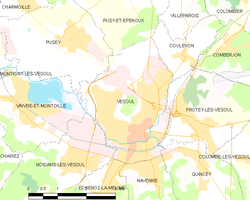Vesoul
Vesoul is a commune. It is the prefecture of the Haute-Saône department in the Bourgogne-Franche-Comté region.
|
Vesoul | |

| |
| Town Hall | |

| |
| Administration | |
|---|---|
| Country | France |
| Region | Free County |
| Department | Haute-Saône |
| Arrondissement | Vesoul |
| Canton | Vesoul-Est and Vesoul-Ouest |
| Intercommunality | Vesoul |
| Mayor | Alain Chrétien (2014–2020) |
| Statistics | |
| Elevation | 213–375 m (699–1,230 ft) (avg. 220 m (720 ft)*) |
| Land area1 | 9.07 km2 (3.50 sq mi) |
| Population2 | 15,637 (2012) |
| - Density | 1,724/km2 (4,470/sq mi) |
| INSEE/Postal code | 70550/ 70000 |
| 1 French Land Register data, which excludes lakes, ponds, glaciers > 1 km² (0.386 sq mi or 247 acres) and river estuaries. | |
| 2 Population without double counting: residents of multiple communes (e.g., students and military personnel) only counted once. | |
Geography
The Haute-Saône is a rural department and is based around five towns: Vesoul (the prefecture), Gray, Héricourt, Lure and Luxeuil-les-Bains. The Durgeon and Colombine rivers flow through the commune.
History
Vesoul is first mentioned in a document dated 899. That document speaks about an elevation with a fortified watchtower. The document speaks about "Castrum Vesulium". Castrum is a fortification, and "Vesulium" has the syllable ves which meant hill or mountain in a language that was spoken before the Celts. Today, there is a castle that forms the centre of the city. The first houses were built inside the walls of the castle. Newcomers who found no place settled outside the city walls, on the flanks of the hill. Growing wine was popular. In 1814, after the fall of the empire, a buffer state was created, with Vesoul as capital. The principality was that of Free County, of the Vosges and of Porrentruy.
Today, one of the main factories of PSA Peugeot Citroën is near Vesoul.
Culture
Monuments and tourist attractions
- Vieux Vesoul (English:Old Vesoul) (buildings from the 15th, 16th and 18th centuries and Garret Museum)
- Site of Vesoul's Motte
- Site of the Sabot de Frotey
- Vesoul-Vaivre lake
- Vesoul-Vaivre Vélo-rail
- Saint Georges church (18th century)
- Convent of the Ursulines (17th century)
Library
The first public library of Vesoul opened in 1771. The abbé (abbot) Bardenet, superior of the Saint-Esprit hospital in Besançon, gave his book collection to the town. There were 1772 books. The collections became a lot larger with the Revolution. At that time, the revolutionaries (people who led the French Revolution) took the books from the monasteries of the town (capucins) and even of the region (Luxeuil and Faverney monasteries). Around 20,000 books were added to the library this way, including some 11th century manuscripts. The Mayor's office was responsible for keeping the books.
In 1981, the municipality decided to build a new building to encourage the public to read. The library recently got computers. There are around 200 manuscripts and 150 incunables.
Twin towns
Vesoul is only twinned with one town:
Demography
| 1793 | 1800 | 1806 | 1821 | 1831 | 1836 | 1841 | 1846 | 1851 | 1856 | 1861 | 1866 | 1872 | 1876 | 1881 | 1886 | 1891 | 1896 | 1901 | 1906 | 1911 |
|---|---|---|---|---|---|---|---|---|---|---|---|---|---|---|---|---|---|---|---|---|
| 5303 | 5417 | 5708 | 5391 | 5408 | 5887 | 6788 | 5941 | 6621 | 7281 | 7579 | 7614 | 7716 | 9206 | 9553 | 9733 | 9770 | 10083 | 9704 | 10163 | 10539 |
| 1921 | 1926 | 1931 | 1936 | 1946 | 1954 | 1962 | 1968 | 1975 | 1982 | 1990 | 1999 | 2006 | 2007 |
|---|---|---|---|---|---|---|---|---|---|---|---|---|---|
| 10471 | 10859 | 11562 | 11926 | 11825 | 12038 | 13678 | 16352 | 18173 | 18412 | 17614 | 17168 | 16370 | 16329 |
Vesoul Media
References
| Wikimedia Commons has media related to Lua error in Module:Commons_link at line 62: attempt to index field 'wikibase' (a nil value).. |





